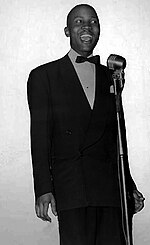Eddie Vinson
Eddie Vinson | |
|---|---|
 Eddie Vinson in May 1980. | |
| Background information | |
| Birth name | Edward L. Vinson Jr. |
| Also known as | Eddie "Cleanhead" Vinson |
| Born | (1917-12-18)December 18, 1917 Houston, Texas, United States |
| Died | July 2, 1988(1988-07-02) (aged 70) Los Angeles, California, United States |
| Genres | Jump blues,[1]R&B,[1]jazz |
| Occupation(s) | Saxophonist, singer, composer |
| Years active | 1930s–1988 |
| Labels | King Records, Mercury, Black & Blue, ABC-BluesWay, Muse |
| Associated acts | Cannonball Adderley, Oscar Peterson, Etta James |
Eddie "Cleanhead" Vinson (born Edward L. Vinson Jr., December 18, 1917 – July 2, 1988) was an American jump blues, jazz, bebop and R&B alto saxophonist and blues shouter.[1] He was nicknamed Cleanhead after an incident in which his hair was accidentally destroyed by lye contained in a hair straightening product.[2] Music critic Robert Christgau has called Vinson "one of the cleanest—and nastiest—blues voices you'll ever hear."[3]
Contents
1 Biography
2 Discography
3 References
4 External links
Biography

Vinson as the leader of his own band, circa mid-1940s - mid-1950s.
Vinson was born in Houston, Texas. He was a member of the horn section in Milton Larkin's orchestra, which he joined in the late 1930s. At various times, he sat next to Arnett Cobb, Illinois Jacquet, and Tom Archia, while other members of the band included Cedric Haywood and Wild Bill Davis. After exiting Larkin's employment in 1941, Vinson picked up a few vocal tricks while on tour with bluesman Big Bill Broonzy. He then moved to New York and joined the Cootie Williams Orchestra from 1942 to 1945, recording such tunes as "Cherry Red". Vinson struck out on his own in 1945, forming his own large band, signing with Mercury Records, and enjoying a double-sided hit in 1947 with his R&B chart-topper "Old Maid Boogie", and the song that would prove to be his signature number, "Kidney Stew Blues".[4]
Vinson's jazz leanings were probably heightened during 1952-1953, when his band included a young John Coltrane. In the late 1960s, touring in a strict jazz capacity with Jay McShann, Vinson's career took an upswing. In the early 1960s Vinson moved to Los Angeles and began working with the Johnny Otis Revue. A 1970 appearance at the Monterey Jazz Festival with Otis spurred a bit of a comeback for Vinson. Throughout the 1970s he worked high-profile blues and jazz sessions for Count Basie, Otis, Roomful of Blues, Arnett Cobb, and Buddy Tate. He also composed steadily, including "Tune Up" and "Four", both of which have been incorrectly attributed to Miles Davis.[5] The aforementioned single-sourced claim is contradicted by the many times Miles Davis has been credited as composer on numerous recordings.
Vinson recorded extensively during his fifty-odd year career and performed regularly in Europe and the U.S. He died in 1988, from a heart attack while undergoing chemotherapy,[6] in Los Angeles, California.
Discography
| Year | Title | Notes | Genre | Label |
|---|---|---|---|---|
| 1957 | Back in Town | Jazz | Charly | |
| 1961 | Cleanhead & Cannonball | with Cannonball Adderley | Jazz | Milestone |
| 1961 | Backdoor Blues | with Cannonball Adderley | Blues | Fantasy |
| 1967 | Cherry Red | Jump Blues, R&B, Swing Jazz | Bluesway | |
| 1969 | Kidney Stew Is Fine | With T-Bone Walker and Jay McShann | Blues | Delmark |
| 1981 | I Want a Little Girl | Art Hillery, Cal Green, John Heard, Roy McCurdy, Martin Banks, Rashid Jamal Ali | Blues | Pablo |
| 1986 | The Late Show | Live with Etta James | Blues | Fantasy |
| 1999 | Cleanhead Blues: 1945-1947 | Import | Blues | Camden/Wave |
| 2006 | Honk for Texas | Blues | JSP | |
| 2007 | Blues, Boogie & Bebop – Meat's Too High | Various | JSP |
With Arnett Cobb
Live at Sandy's! (Muse, 1978)
With Oliver Nelson
Swiss Suite (Flying Dutchman, 1971)
With Buddy Tate
Live at Sandy's (Muse, 1978 [1980])
References
^ abc Du Noyer, Paul (2003). The Illustrated Encyclopedia of Music (1st ed.). Fulham, London: Flame Tree Publishing. p. 181. ISBN 1-904041-96-5..mw-parser-output cite.citation{font-style:inherit}.mw-parser-output .citation q{quotes:"""""""'""'"}.mw-parser-output .citation .cs1-lock-free a{background:url("//upload.wikimedia.org/wikipedia/commons/thumb/6/65/Lock-green.svg/9px-Lock-green.svg.png")no-repeat;background-position:right .1em center}.mw-parser-output .citation .cs1-lock-limited a,.mw-parser-output .citation .cs1-lock-registration a{background:url("//upload.wikimedia.org/wikipedia/commons/thumb/d/d6/Lock-gray-alt-2.svg/9px-Lock-gray-alt-2.svg.png")no-repeat;background-position:right .1em center}.mw-parser-output .citation .cs1-lock-subscription a{background:url("//upload.wikimedia.org/wikipedia/commons/thumb/a/aa/Lock-red-alt-2.svg/9px-Lock-red-alt-2.svg.png")no-repeat;background-position:right .1em center}.mw-parser-output .cs1-subscription,.mw-parser-output .cs1-registration{color:#555}.mw-parser-output .cs1-subscription span,.mw-parser-output .cs1-registration span{border-bottom:1px dotted;cursor:help}.mw-parser-output .cs1-ws-icon a{background:url("//upload.wikimedia.org/wikipedia/commons/thumb/4/4c/Wikisource-logo.svg/12px-Wikisource-logo.svg.png")no-repeat;background-position:right .1em center}.mw-parser-output code.cs1-code{color:inherit;background:inherit;border:inherit;padding:inherit}.mw-parser-output .cs1-hidden-error{display:none;font-size:100%}.mw-parser-output .cs1-visible-error{font-size:100%}.mw-parser-output .cs1-maint{display:none;color:#33aa33;margin-left:0.3em}.mw-parser-output .cs1-subscription,.mw-parser-output .cs1-registration,.mw-parser-output .cs1-format{font-size:95%}.mw-parser-output .cs1-kern-left,.mw-parser-output .cs1-kern-wl-left{padding-left:0.2em}.mw-parser-output .cs1-kern-right,.mw-parser-output .cs1-kern-wl-right{padding-right:0.2em}
^ Otis, Johnny. Upside Your Head!: Rhythm and Blues on Central Avenue, Wesleyan University Press, page 34, (1993) -
ISBN 0-8195-6287-4
^ Christgau, Robert (1981). "Consumer Guide '70s: V". Christgau's Record Guide: Rock Albums of the Seventies. Ticknor & Fields. ISBN 089919026X. Retrieved March 21, 2019 – via robertchristgau.com.
^ Vladimir, Bogdanov. All Music Guide to the Blues: The Definitive Guide to the Blues, Backbeat Books, page 571, (2002) -
ISBN 0-87930-736-6
^ Koster, Rick. Texas Music, St. Martin's Press, page 319, (2000) -
ISBN 0-312-25425-3
^ Doc Rock. "The 1980s". The Dead Rock Stars Club. Retrieved 2015-10-07.
External links
- Houston's own, Eddie "Cleanhead" Vinson!
- NBR: Blues and Jazz Get Rollicking Together
Blues Lyrics: Eddie "Cleanhead" Vinson at the Wayback Machine (archived October 27, 2009)- All About Jazz: Eddie "Cleanhead" Vinson
- 'I Remember Eddie Cleanhead Vinson', by Steve Holt